“At first I thought Vietnam was just another stop on my journey, but the people, the food, and the little pockets of quiet right in the middle of bustling streets made me stay longer,” once said a fellow digital nomad of mine.
And that’s when I realized Vietnam isn’t just a place to visit but a haven for digital nomads to work and truly experience life.
As a local Vietnamese and travel enthusiast, I’ll walk you through everything you need to know for life as a digital nomad in Vietnam, from visas and healthcare to top spots to settle (and some local secrets).
So keep reading, and you’ll discover more hidden gems along the way.
Dreaming of working remotely?
I created a free guide to help you build digital skills and start working online — even if you’re starting from zero.
Download the Remote Work Starter GuideIs Vietnam Worth Living for Digital Nomads?
Low Cost of Living
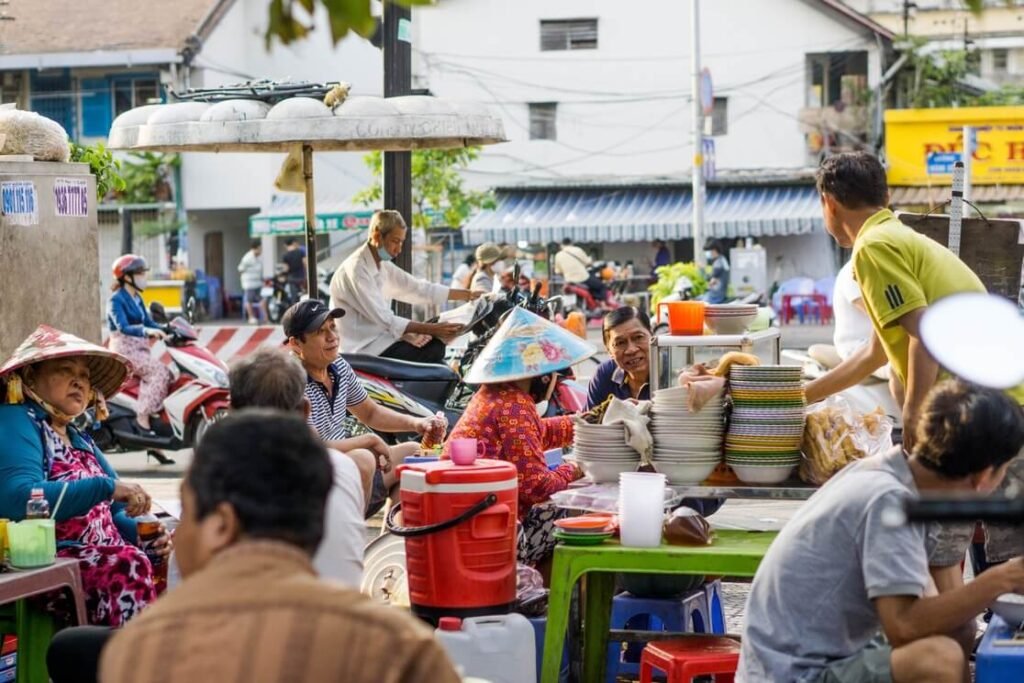
A bowl of Pho with extra beef and noodles would only cost around 50,000 VND (less than $2).
Renting a stylish apartment with full amenities in Ho Chi Minh City or Da Nang costs about 8-12 million/month, much cheaper than Thailand or Bali.
Not all Vietnamese locals are wealthy enough to afford cars or the latest phone model, but most people live comfortably, rarely worrying about not having enough money for food and life necessities.
For digital nomads from Europe or high-cost countries, the cost of living here is really easy on the wallet, so instead of worrying about running out of money, the real challenge might be not to get carried away by the fun and affordable lifestyle.
Wifi Everywhere
Locals, especially office employees or students, love camping out at coffee shops to chase deadlines, and this has become a culture among young people. So, almost every café will offer you free Wi-Fi, power outlets, and no time limits on how long you can stay. Even small eateries or takeaway stalls offer free Wi-Fi so you can make online payments.
However, traveling around the city requires 4G, so you’ll need to register SIMs with local SIM providers like Viettel, Mobiphone, or Vinaphone.
Vibrant Lifestyle
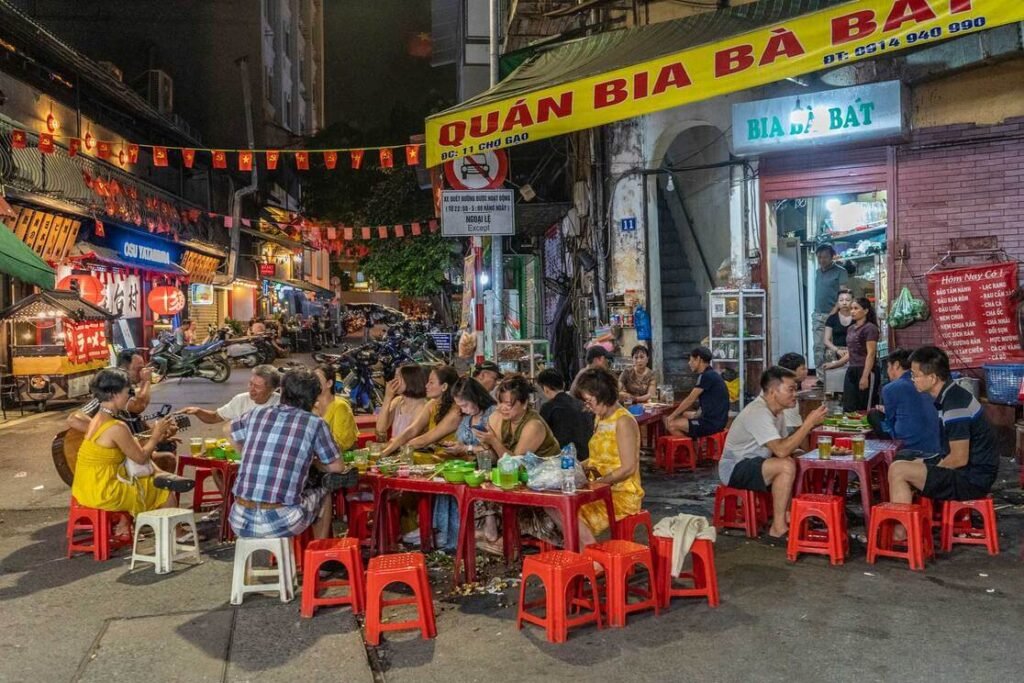
At first, life in Vietnam seems to be somewhat chaotic, with motorbikes darting and weaving, filling every gap in traffic. But at night, everything gets calmer, as this is the time when locals start to hang out, and life truly begins.
From small towns to large cities, you’ll find yourself immersed in a great atmosphere filled with laughter and chatter, and the scent of grilled skewers drifting through the air, making your stomach grumble. This unusual combination of hectic streets, peaceful corners, and vibrant lifestyle makes this city never dull, even to locals.
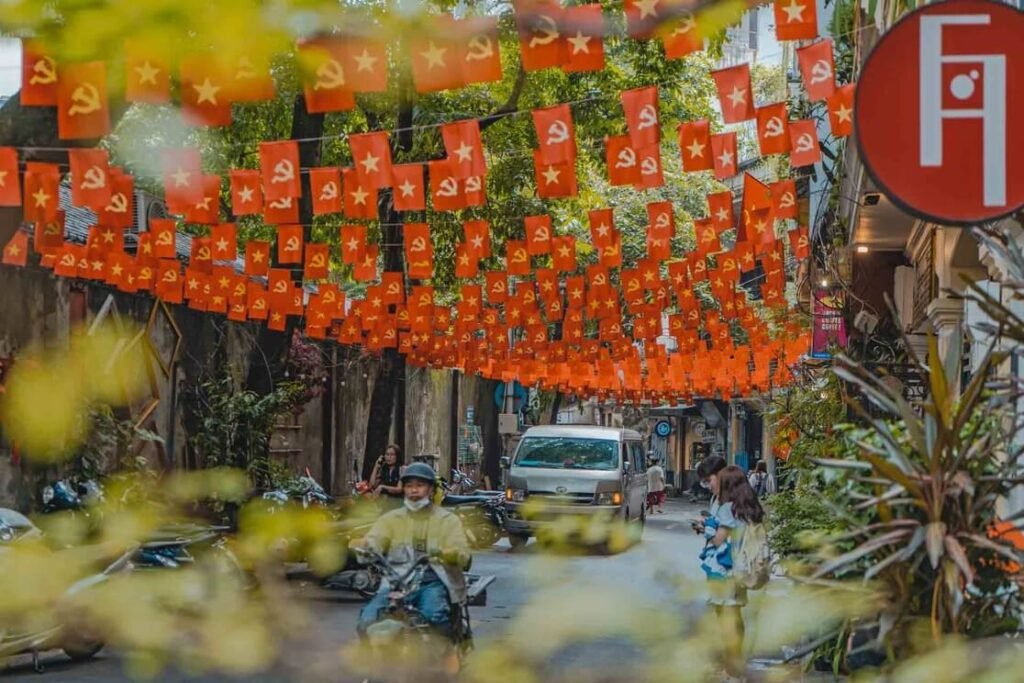
Whenever Vietnam wins a football match or celebrates a national holiday, I always find myself caught up in a river of red flags and roaring crowds. This is a truly unforgettable and joyful experience for both locals and tourists who are lucky to be around on these occasions.
Delicious Cuisine
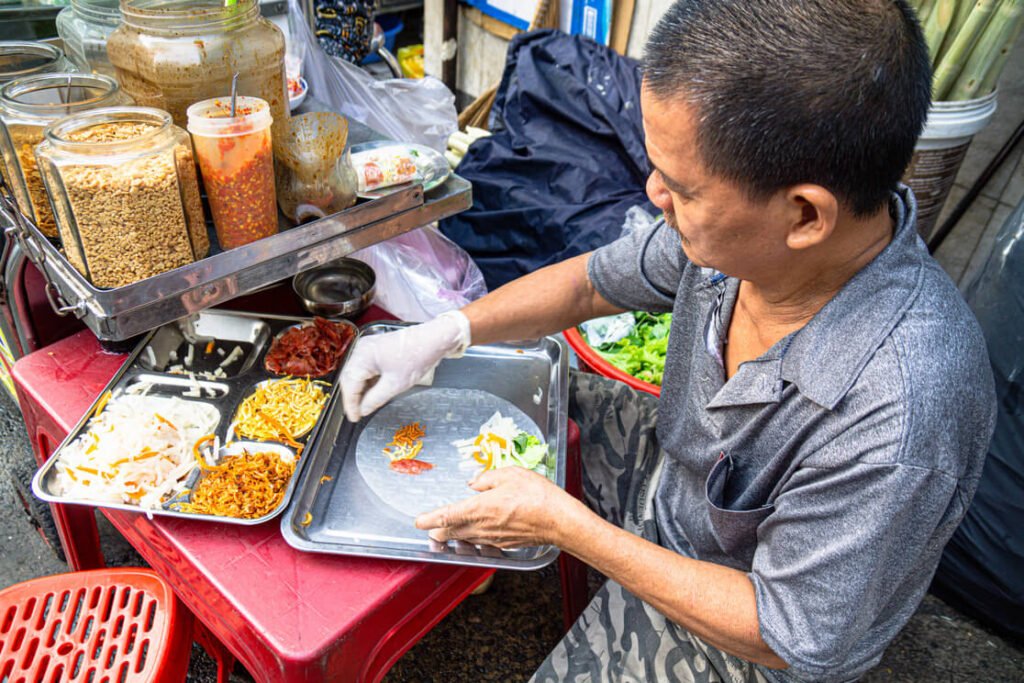
Made with fresh ingredients and inspired by the use of herbs and fruits, Vietnamese dishes strike a perfect balance between sour, spicy, sweet, and salty, which is both delicious and healthy.
No matter whether you’re sitting in a street-side food stall or a luxurious restaurant, dishes will always be rich in flavor and surprisingly affordable.
Especially foods like Goi Cuon (Fresh spring rolls), Banh mi, or Banh xeo (Pancake) are not only locals’ favorite hangout snacks but also staples in the daily life of many locals.
There’s so much to uncover, and I can’t wait to show you more as we explore below.
Insurance for Digital Nomads in Vietnam
As in Vietnam, medical treatments are pay-first and can be of high cost, so without proper insurance, healthcare costs might still be significantly high despite generally affordable prices.
Besides International Insurance options, Vietnam’s Social Insurance program, a national welfare system open to both locals and foreigners, is also essential to keep in mind so you don’t get confused.
Who Needs to Join Vietnam’s Social Insurance?
If you only work online for a foreign company and don’t have a contract with a Vietnamese business, you’re not required to pay for Social Insurance.
On the other hand, if you have a labor contract with a Vietnamese company that is valid for at least 1 year, or an indefinite-term contract, you are required to join.
Should Digital Nomads Join Vietnam’s Social Insurance Program?
Yes, if you plan to stay for the long haul. However, if you only stay for several months, the true value may not be substantial, let alone dealing with all the paperwork.
Either way, this will help you make informed decisions afterwards, especially if you’re working under a local contract.
Before 2022, foreigners could only access short-term benefits, like sickness, maternity, occupational accidents, and work-related diseases. Since January 1, 2022, foreign workers in Vietnam are entitled to retirement pensions and death benefits, just like Vietnamese workers.
Tip: Don’t forget to check if your international insurance covers Vietnam and includes repatriation; it’s a small step that can save you a lot of trouble later.
Where to Go When You’re Sick in Vietnam

Most public hospitals are crowded in big cities like Ho Chi Minh. But it’s understandable because they have some of the best doctors and facilities. Since they’ve long been funded and managed by the government, you can trust their professional expertise.
International and private hospitals differ in that they offer personalized care, shorter waiting times, and, of course, English-friendly services, which are much more convenient for digital nomads. Even so, prices vary quite significantly, as does quality, so it’s best to check reviews before choosing.
Note: Public hospitals also offer VIP options, known as “dịch vụ” wards, which are ideal if you prefer trusted doctors, privacy, and transparent pricing.
Reputable Hospitals in Vietnam Trusted by Locals:
Public hospitals:
- University Medical Center (Ho Chi Minh)
- Bach Mai (Hanoi)
- Da Nang Hospital
Private & International hospitals:
- Vinmec International Hospital (available in major large cities)
- FV hospital (French-managed hospital with English-speaking staff) (Ho Chi Minh City)
- Tam Anh General Hospital (Ho Chi Minh City)
- Hanoi French Hospital
- Hong Ngoc General Hospital (Hanoi)
- Hoan My Da Nang Hospital
Does Vietnam have a Digital Nomad Visa?
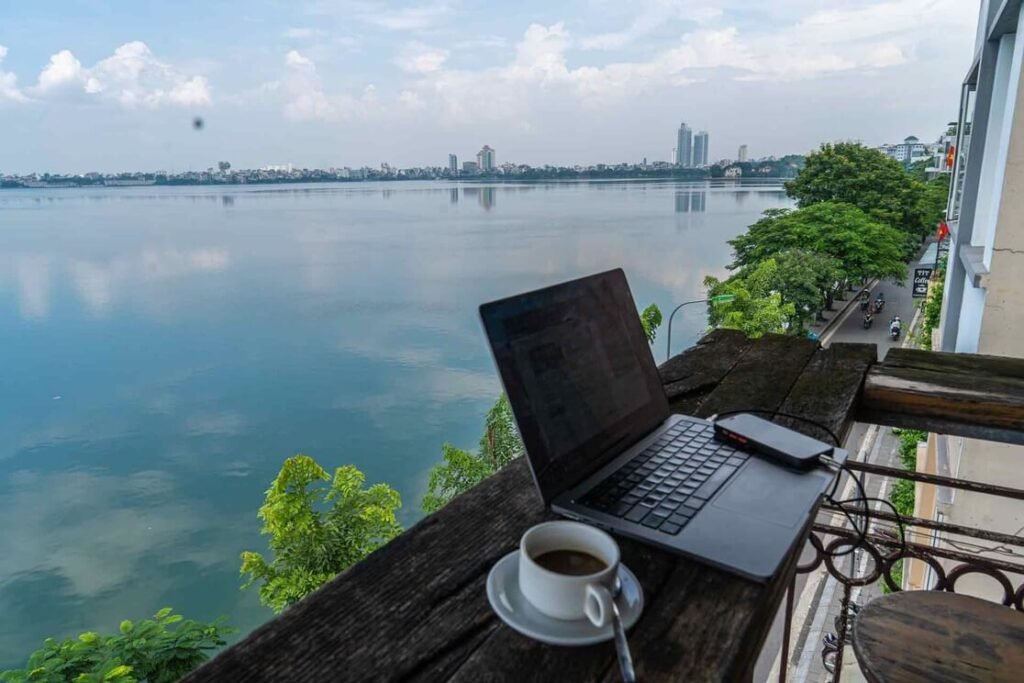
For now (2025), Vietnam has not yet provided visas for digital nomads. However, there are still lots of other legal options to live and work online here, according to the length of your stay plan.
Common Types of Visas for Digital Nomads in Vietnam
| Visa type | Symbol | Duration | Suitable for | Notes |
| Tourist visa | DL | Maximum stay of 90 days, and cannot extend your stay without leaving first | Tourist, short-term remote worker | You cannot work for a Vietnamese company |
| Business visa | DN1, DN2 | 3-12 months | People working/partnering with a Vietnamese company | |
| Investment visa | ĐT | 1-5 years | Investor, capital contributor | Requires an investment license or business registration in Vietnam. |
| Work visa | LĐ1, LĐ2 | Up to 2 years | Foreigners with a valid work permit | Not suitable if you only work online for overseas companies. |
| Temporary Residence Card (TRC) | Corresponds to the visa type | 1–5 years | Long-term residents, sponsored by a company | Convenient if you plan to stay in Vietnam for more than one year. |
You can apply for an e-Visa on the official portal, which is faster and more convenient: https://evisa.gov.vn/
A single-entry visa costs you 25 USD, while a multiple-entry one costs 50 USD.
Note: Vietnam currently does not allow online e-visa extensions. If you wish to stay longer, you must do a visa run.
If you overstay your visa, you will face an administration fine of 500,000 – 4,000,000 VND, or even be banned temporarily from entering the country.
Do Digital Nomads in Vietnam Pay Tax?
Permanent resident or not, staying in the country for more than 183 days within 12 months still makes you a tax resident, according to Vietnam’s Law on Personal Income Tax. And you’re required to declare and pay tax for your whole worldwide income, unless your home country and Vietnam have a Double Taxation Agreement (DTA), which will prevent you from being taxed twice on the same income.
What Jobs can Digital Nomads in Vietnam do?
You can teach English for free on a tourist visa at community events. Still, as soon as you receive any payment, you’ll need a work visa and permit to teach legally, and other teaching certificates like TESOL/TEFL certificate or relevant experience. Salary varies around $18-25/hour at language schools or centers.
This goes the same for any other small businesses. With a proper visa and registration, you can also open a small food business, like street vendors, to sell your home-country snacks or dishes to share your culture while experiencing the local rhythm.
Otherwise, let’s just stick with your remote work.
Best cities for digital nomads in Vietnam
If you’re looking for a ‘long-term camping’ place in your journey of remote working, Vietnam provides you with lots of options. Below are the 3 best destinations with dynamic digital nomads and expat communities.
- Da Nang
- Ho Chi Minh
- Hanoi
Da Nang

Da Nang has long been a ‘paradise’ for digital nomads because of its fresh atmosphere, beautiful coastline, and affordable lifestyle. Although Da Nang is also a tourist spot, it’s much less crowded and chaotic.
This city is super friendly for digital nomads and expats. You can find lots of co-working spaces and connect with fellow digital nomads here.
- Weather: Sunny and hot all year, with some rainy months in autumn
- Co-working space: Enouvo Space, DNC, IoT Hub
- Fun activities: Jogging along the coastline in the morning
Ho Chi Minh City
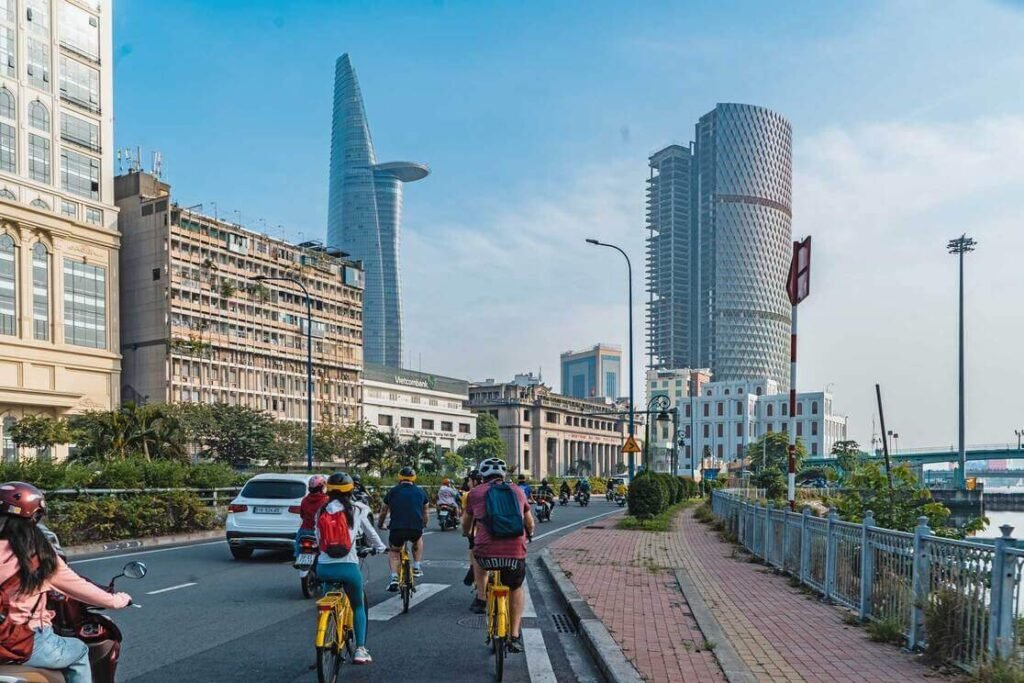
If you love a hustle and bustle lifestyle with young people and opportunities for work, Ho Chi Minh City (Saigon) is your ‘ideal playground.’ The city offers everything you need: a modern coworking space, a dynamic freelancing community, and coffee shops that open 24/7. However, going around in this city is a little chaotic.
Weather: Always hot, with dry seasons and rainy seasons. Also, rainy seasons often cause flooded streets in some areas and vehicle damage.
Coworking space: Dreamplex, the HIVE, Socialer, and Co-Nest.
Local 24/7 cafés: The Coffee House, Three O’clock Coffee, and Ong Bau.
Note: Phuc Long is popular with both local workers and foreigners, but it doesn’t stay open overnight.
Hanoi
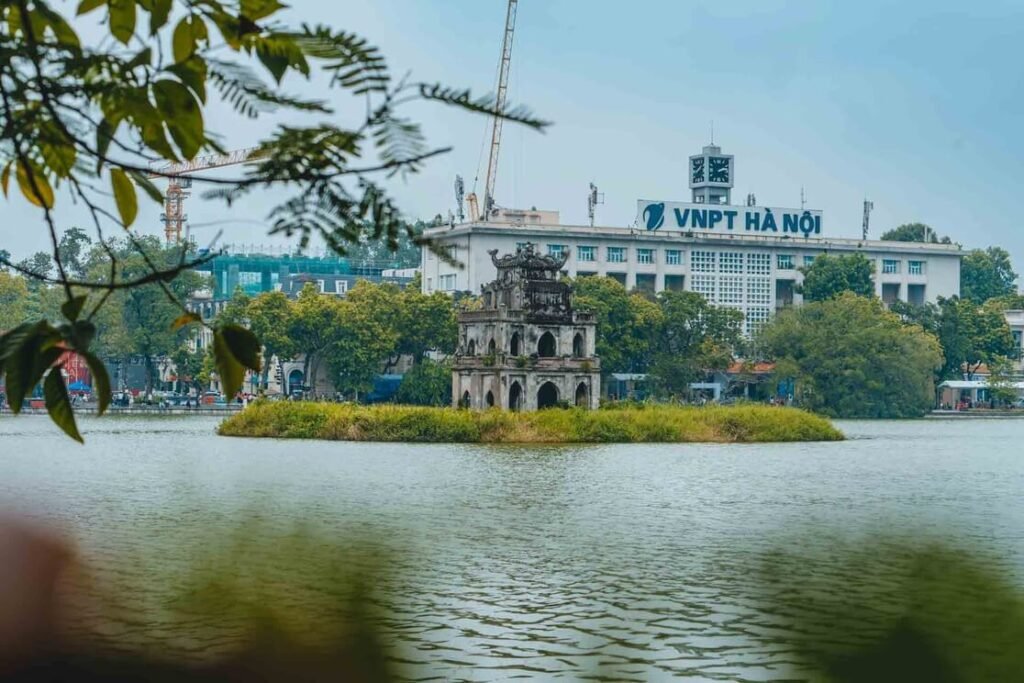
Hanoi brings a whole different ancient, tranquil, and culture-rich vibe, making it especially ideal for digital nomads seeking quietness, loving arts, or wanting to feel the ‘Vietnamese soul’ in every corner of the city.
Hanoi’s streets are abuzz with countless side-by-side eateries and small vendors, so you’ll have endless food options to explore when living here.
Weather: 4 seasons with distinct patterns, with autumn being extremely comfortable and beautiful. However, it does not snow here.
Lifestyle: A mix between culture and modernity, which can be ideal for writing and creative jobs.
Coworking space: Toong, COGO, eSpace, Space Belvedere.
Local working-friendly cafés: Biblio Cafe, Tungbook Cafe, and Bason Cafe.
Housing Options and Prices
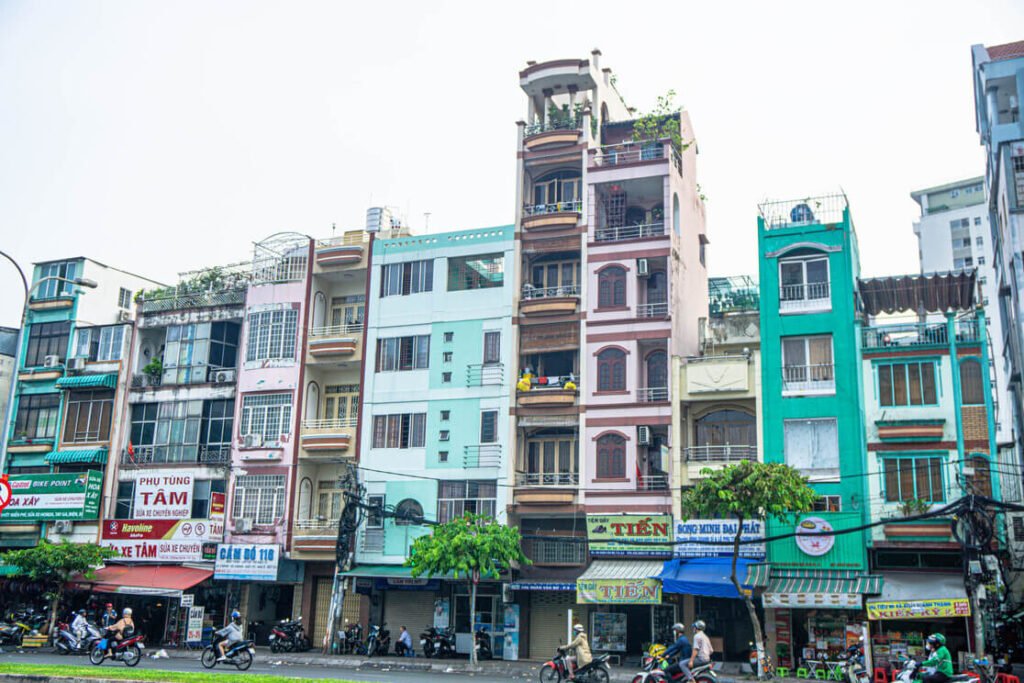
Aside from Airbnb (for short stays), most of my digital nomad and expat friends in Vietnam prefer a studio or residential apartment for extended stays, typically lasting several months.
These housing options often include both furnished and unfurnished options, as well as other modern perks such as swimming pools, gyms, or grocery stores right within the complex. The cost would be around 5-10 million VND per month.
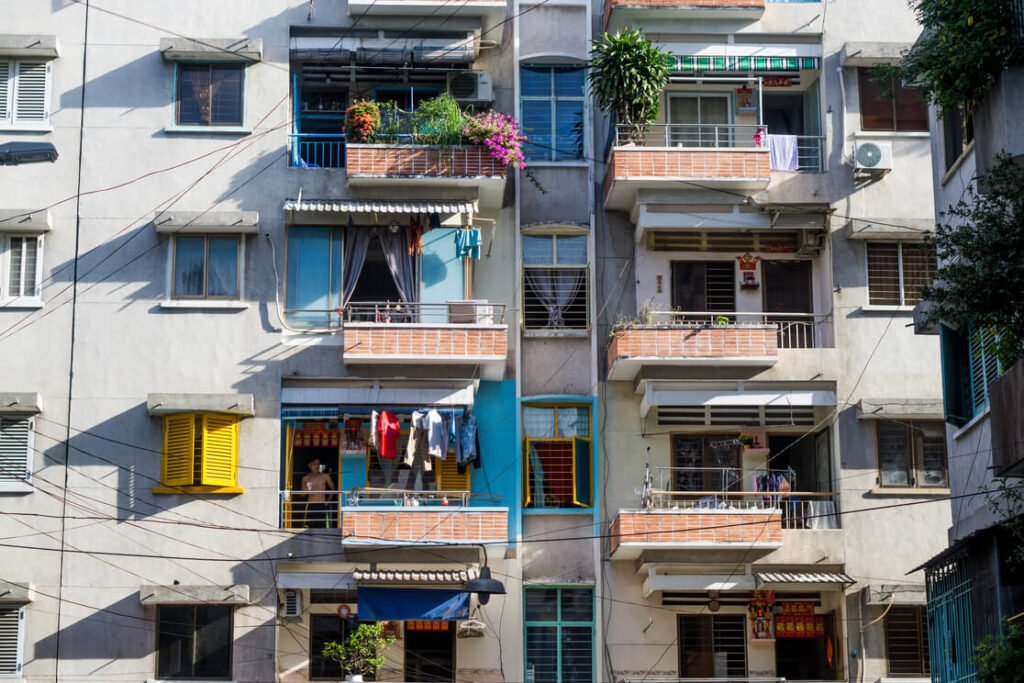
Another budget-friendly choice is sharing rooms with Vietnamese locals, though I find it quite inconvenient, as you’ll need to share the kitchen and bathroom with strangers.
Here’s a quick breakdown of common options and their prices:
| Housing Options | Rent Prices | Note |
| Airbnb | ~1-5 million VND/5 nights($40–200) | 20–40 m². Suitable for short stays due to high prices. |
| Private Room in a local boarding house | ~2-6 million VND/month($80–240) | 15–25 m². A single room with a private bathroom |
| Studio/Apartment | ~7-15 million VND/month($280–600) | 25–60 m². Choose between furnished and unfurnished.Studios are smaller but fully private |
| Shared Apartment/Room | ~3-5 million VND/month($120–200) | Usually have to share the kitchen and bathroom |
| Houses in the suburbs/countryside | ~1.5-8 million VND/month($60–320) | 60–100 m². Usually detached houses with extra outdoor space or a small yard. |
Note: Prices may vary by around 2 million VND depending on the neighborhood. Generally, Ho Chi Minh City has higher rental prices, while Danang is more affordable, even though it’s a tourist city.
In smaller countryside
Tips for Finding Housing in Vietnam
Facebook groups are a great place to look, as room owners (but mostly middlemen) advertise their rooms here. You can search for keywords like ‘Nha tro quan 7,’ which means ‘Boarding house district 7.’
But it’s better to have a local to assist you with this, as you may face scams and communication barriers along the way.
Or you can go around your neighborhood to look for rental houses and see them in person. Most of these will have phone numbers hanging in front of the gates. And if you’re lucky enough, you’ll work directly with homeowners and get much better rates.
Note: Do not make any deals or transactions online unless you have seen the room in person. Most pictures are inaccurate, and you should also consider whether your room has enough light, security, the surrounding environment, and neighbors.
How to Get Around in Vietnam?
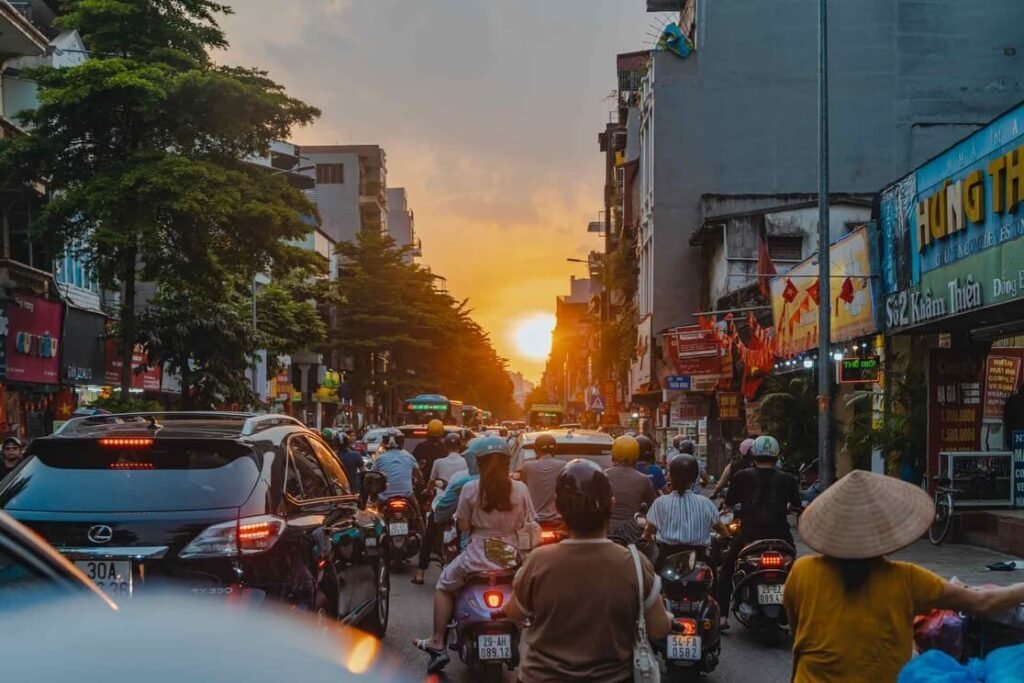
Traffic during rush hour in Ho Chi Minh City can be intense, so hopping on a motorbike with a driver is often the wiser and very local way to weave through the chaos.
I would recommend booking apps like Grab, Be, or Xanh SM (electric vehicles).
That said, your life would be easier if you could drive yourself. Renting a motorbike is simple here as long as you have an international driver’s license.
If you do not have a driver’s license but want to drive yourself, you can rent a 50cc scooter. Please keep in mind that you will need a license for vehicles with engines larger than 125cc.
Prices vary according to the length of your rental agreement. Here are a few examples:
- 30,000-50,000 VND/hour ($2-5)
- 100,000-250,000 VND/day ($4.5-6)
- 1,000,000-2,500,000/month ($45-110)
You can also take intercity buses. It’s best to download the BusMap to track the arrival time and routes, and buses usually arrive every 20-40 minutes at your bus stop.
Everyday Vietnamese Comfort Food
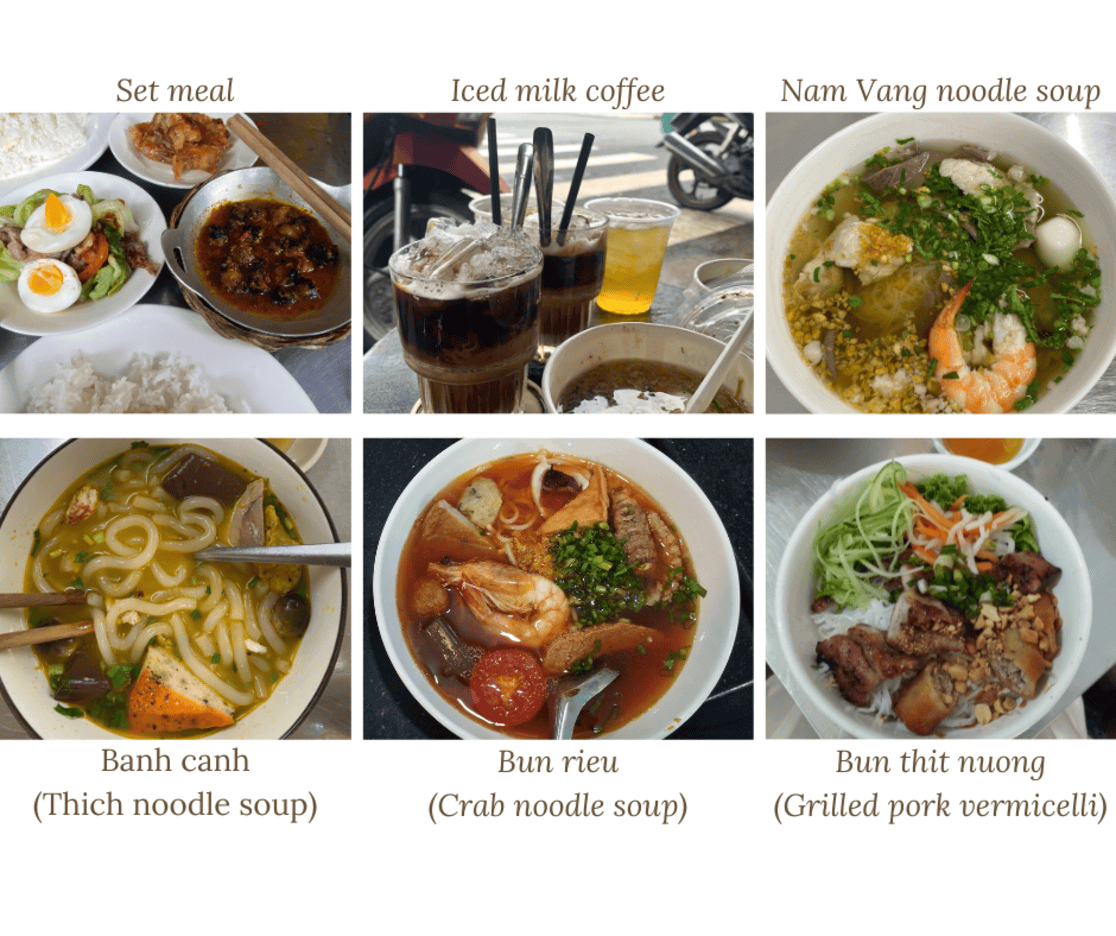
Street food is plentiful, but here are some of my go-to Vietnamese comfort foods (and drinks) you can find in every city.
I usually enjoy having a cup of “Ca phe sua da,” or iced milk coffee, on the side of the road to kickstart the day.
For locals, this is a daily ritual that serves as “fuel” to keep us going, either before work or during lunch breaks. It only costs around 20,000-30,000 VND (less than $1) for a cup of rich, aromatic coffee.
For lunch and dinner, here’s what locals reach for every day:
| Dish/Drink | Price (VND – $) |
| Com phan (Set meal: rice, egg salad, stir-fried snails with lemongrass, fried fish, and soup included) | 80,000 (~$3.4)or 30,000 each if solo (~$1.2) |
| Nam Vang noodle soup | 60,000 (~$2.4) |
| Banh canh (Thick noodle soup) | 45,000 (~$1.8) |
| Bun rieu (Crab noodle soup) | 45,000–60,000(~$1.8–$2.4) |
| Bun thit nuong (Grilled pork vermicelli) | 45,000 (~$1.8) |
Note: In the south, food will be richer in its sweetness, saltiness, and sourness, while people in the north eat more tender and slightly.
If you order through apps, prices tend to double, depending on your distance. But usually, you’ll find hidden gems right in front of your place, so it’s best to go and try around.
Starting Life as a Digital Nomad in Vietnam
If you’ve read this far, you’ve almost mastered the locals’ survival tips for a new life in Vietnam as a digital nomad.
Having grown up here myself, I still can’t stop admiring the hospitality of aunties and uncles in my hometown. So I hope you, my fellow international digital nomads, will soon feel this welcoming warmth as you settle in this lovely country.
I hope you liked this article and you’re ready for your adventure as a digital nomad in Vietnam. Be sure to also check out: How to Make Your Money Last When Traveling
Author bio

Vy Phan, born and raised in the Mekong Delta, has long carried the rhythm of travel in her soul. Now, as part of Jackfruit Adventure, a local Ho Chi Minh and Hanoi cycling tour team, she channels that spirit into sharing Vietnam’s authentic sides, from peaceful alleyways and early-morning markets brimming with traditional flavors to the vibrant daily life of the hospitable locals.
